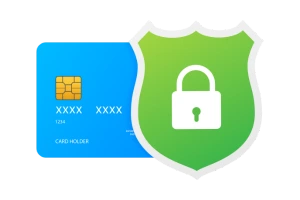
TABLE OF CONTENTS

You might know Cash App as a simple way for merchants and consumers to transfer funds. However, simplicity doesn’t always equal security—and Cash App business account scams can catch your business in a bind if you aren’t prepared.
Former employees allege somewhere between 40%-75% of the accounts they reviewed were fake, fraudulent, or represented multiple profiles for a single individual. While Block (the owner of Cash App) disputes these figures, this information is still concerning. Business owners and consumers should carefully approach transactions on the app to avoid falling victim to the most common Cash App security breaches.
Here, we’ll walk through the platform’s overall safety—as well as common scams you’re likely to encounter, preventative measures you can take to avoid them, and what to do if you fall into a trap.
Is Cash App Secure for Your Transactions?
Despite the prevalence of scams on the platform, Cash App’s transaction security keeps your information well-guarded. The app’s robust transaction and data management framework employs a PCI-DSS level 1 certification—the highest standard in the payment card industry.
End-to-end data encryption protects both personal and financial information as it transmits through the app. Plus, Cash App fraud detection protocols protect you from unauthorized charges. These include transaction monitoring through machine learning technology, which automatically spots and flags anomalous behavior like suspicious transaction amounts or locations.
Protecting your Cash App account login is also easier with two-factor authentication (2FA). The platform requires that you submit a code sent via text to your phone when logging in. This method prevents Cash App identity theft through just your username and password.
Finally, if your Cash App security is breached, you can remotely disable your account via the app instantly. Your account comes equipped with the ability to require face ID, passcodes, or touch ID for outgoing transactions. If more drastic measures are required, an account can be zeroed out and deleted in a few simple steps.
With all this in mind, Cash App business scams may seem easy to avoid—but unfortunately, the platform isn’t foolproof. You’ll need to stay vigilant to prevent creative scams. From phone scams to fake products to all-out identity theft, it’s important to understand the current risks and what you can do to guard against fraud.
Uncovering the Most Common Cash App Business Scams
The best way to avoid Cash App business account scams is to be aware of them. This way, you can spot suspicious activity before you give away important business information or unauthorized funds.
Let’s take a closer look at five common iterations to watch for.
1. #CashAppFriday
Cash App ran Twitter sweepstakes a few years back using #CashAppFriday to find winners. The original idea was the real deal—a fun promotional campaign by Cash App itself. However, scammers quickly caught on and found a way to use it to their advantage.
Fraudulent social media accounts designed to look like the real corporate profile posted their own fake #CashAppFriday threads. Then, the scammers behind these accounts would contact the users who participated in their fake promotional posts to declare them the winner. However, to claim their prize, users would need to send a small sum of money or provide their login information.
This is a specific instance of a common formula that scammers use. So, be wary of any “prize sweepstakes” that ask you to send them money or ask you for any identifying information.
If you’re ever unsure about the veracity of communications from Cash App, reach out directly to the company to make sure they’re the ones behind the email, text, or message you received.
2. Fraudulent Phone Support
Speaking of reaching out directly to Cash App, one of the most ubiquitous tactics scammers use is posting fraudulent customer support numbers. These Cash App business scams aim to get you on the phone or direct messaging with someone you believe to be a representative of the platform. Then, the fake customer support agent will ask you for information like your 2FA code to get around Cash App security protocols.
They may also ask for a variety of other information or actions such as performing a “test” transaction. This is obviously no test of any kind—just a way to separate you and your money.
Think twice before reaching out to a support number found anywhere outside of your account settings. The most sophisticated versions of these scams create social media profiles—or even websites—that appear to be official communication channels for Cash App. Only contact the company through the outreach information located in-app.
3. Fake Cash Assistance Programs
In the same vein as the #CashAppFriday scam, bad actors often leverage realistic grants or assistance programs to draw in potential victims. Generally, these Cash App scams position the victim as a beneficiary of a federal or otherwise organized monetary assistance program.
COVID-19 gave these scams a jumpstart on Cash App, as real relief programs created an opening for fraudsters to exploit. However, this fake pandemic assistance has outlasted the implementation of federal relief.
If you’re contacted regarding your eligibility for any potential assistance program, keep your guard up. Scammers may use text, email, messenger, or social media to contact you and lure you in. From there, they’ll ask you to either send an initial sum of money via your Cash App account or to provide personal and financial information.
4. Non-existent Product Listings
Perhaps one of the easiest Cash App business scams to fall into is the fake product listing. Predictably, the scammer never intends to deliver the promised product or service after you’ve submitted your payment. Since Cash App transactions are instantaneous and you can’t cancel them after initiation, the platform is an ideal payment method for these types of scams.
Of course, not all suppliers and services who use Cash App as a payment method are scammers. But you should always check reviews and do your due diligence ahead of time to make sure you’re dealing with an honest seller.
5. Stealing Your Identity Through Cash App
Typical phishing scams are a go-to method for digital identity thieves all over the web. Cash App is no exception. Cybercriminals generally rely on some form of social engineering. This includes getting you to enter your login credentials into a fake website by claiming to be support personnel—to obtain either personal or financial information.
Once a scammer has obtained your login information or financial details, they can easily steal funds directly from your account. Alternatively, they can also sell your information on the dark web—which means it could wind up in anyone’s hands.
Regardless of how legitimate a line of communication looks, you should remain cautious. Confirm with customer support in the app that a message is not fraudulent before clicking on any link or responding. Always go the extra mile to protect your identity before responding with personal information.
How to Safeguard Against Business Scams on Cash App
Unfortunately, Cash App can’t do anything to prevent scams that leverage off-platform outreach methods to obtain information or funds from you. Scammers are always looking for ways around the established Cash App security protocols protecting accounts. That’s why many of the most common Cash App scams aim to get you to compromise the security of your account through some form of social engineering. With this in mind, the key to avoiding scams on Cash App is to follow behavioral guidelines that protect your information.
First and foremost, you should only send sums via Cash App to accounts that you trust. Limit Cash App transactions to suppliers and services you have a history of working with if possible and treat any outside communication from an unknown source with suspicion.
There is no federal insurance for funds that you store in your Cash App balance—so don’t store money in the app for long periods of time.
As an extra measure, toggle on the Security Lock in the app’s settings for added protection. You can modify Cash App’s Security Lock to require a passcode to complete any transaction. Doing this adds another protective barrier to your account.
Steps to Take if You Fall Victim to a Cash App Business Scam
If you fall victim to a Cash App business account scam, a quick response can help minimize any losses. You can start by reporting the transaction to your bank. Your bank will help secure funds in the now-compromised account by freezing your card. Plus, if possible, they’ll help you dispute a charge directly on your card.
Then, report the potential scam to Cash App itself. You can do this under the support tab in your Cash App account. Follow the prompts to “Report a Payment Issue.”
At the same time, report the account as a scammer by tapping “Report” at the bottom of the profile screen. You’ll also want to change the security settings of your Cash App account, such as PINs and passwords.
You may want to file a police report regarding the stolen funds as a final step. After that, continue to monitor your bank and Cash App account to catch any more fraudulent activity right away.

Recovering Your Funds on Cash App
So how do you get your money back? While you can’t cancel instant transfers in the app, you have options when trying to recover the funds.
Canceling the charge directly on your card or through your bank is one of the most reliable methods; you can also try to cancel the transaction in the app if it hasn’t yet gone through. You can tell if funds haven’t been transferred yet if you see a “Cancel” button on the transaction in your account. If there is no option to cancel, the funds have already been transferred.
In this case, you can still dispute the transaction in the app. To do this, click on the transaction and locate the “Need Help & Cash App Support” option under the icon that appears to be three dots in a row. From there, follow the prompts to dispute the fraudulent transaction.
Making Informed Choices With Cash App Safety
Cash App business scams are all too prevalent—but can be avoided if you shield your personal and financial information from common social engineering attempts.
Put simply, Cash App is best used to transfer P2P funds because instantaneous transactions can’t always be refunded. While Cash for Business extends capabilities to merchants, these business account counterparts don’t offer any real extra protection. Cash for Business may seem like a cheap and easy payment processing solution for businesses—but you take on a great deal of personal risk in doing so.
Why take this risk unnecessarily? You can find a payment processor that works with your needs. When you partner with PaymentCloud, a dedicated account manager will find a solution that fits your exact specifications. We offer rigorous measures to prevent eCommerce fraud so you can rest easy knowing there is fraud protection for your business.
Learn more about Payment Cloud’s advanced fraud prevention tools today. Together, we’ll find a secure solution for your business.
FAQs
Can identity theft happen through Cash App?
Yes, scammers can steal your personal information using Cash App. Never provide sensitive details like bank information, card numbers, login codes, PINs, or social security numbers to anyone posing as a Cash App support agent.
Guard your information vigilantly when communicating about your account or fund transfers. Use strong, unique passwords, enable two-factor authentication, be wary of unsolicited requests, and never share account information.
Will Cash App provide refunds for business transactions?
Typically, Cash App won’t provide refunds for fraudulent business transactions. This is because most monetary transfers on the platform are instantaneous, making it impossible to cancel them after the fact.
That said, you can dispute charges within Cash App. The merchant will be given time to review the transaction and the card network will make a final decision regarding your claim. This process provides some recourse—but it’s not a guarantee that you will receive your funds back.
The merchant can also initiate their own refund, although that’s unlikely to happen when dealing with a scammer.
If you believe you’ve been scammed, start by disputing the charge directly on your card. Depending on the terms of your card or account, they may issue you a refund.
Is it possible to initiate chargebacks on Cash App?
Initiating chargebacks from Cash App scams can be difficult because of the instant nature of transactions on the platform. Most of the time, you won’t be able to resolve the scenario with a straightforward chargeback option. However, there are a few scenarios in which you may be able to get a chargeback.
If you conduct a transaction via a linked credit card, you may be able to initiate a chargeback directly through your issuer. In this case, the chargeback process is governed by your credit card issuer’s policies, not Cash App’s.
You may also be able to reclaim your funds through Cash App’s dispute process. Provide transaction information through the support feature in the app to initiate the process; then, Cash App will investigate the matter. If they find the transaction was indeed unauthorized, they may reverse it. However, this process is not guaranteed to result in the retrieval of your lost funds.




